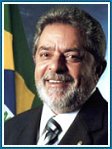|
| |
| Revised | version française | Bulletin Board | Glossaries | Sponsors | G8 Online Courses | G8 Information Centre | Contact Us |
|
Featured Content and
2003 Summit Images to Download
2003 G8 Pre-Summit Conference: Governing Globalization: G8, Public and Corporate Governance |
Featured Content, Student Bulletins: June 01, 2003President Luiz Inacio Da Silva (Brazil) speaks with the G8 + 17 |
1 June, 2003 |
|
|
Following the Enlarged Dialogue working session on June 1, 2003 at the G8 Summit in Evian, President Luiz Inacio Lula da Silva discussed the events of the day1. Da Silva expressed his pleasure at the opportunity for leaders of both rich and poor countries to talk and listen to one another on the issues of economic growth, free trade and development. He stressed the need for less developed countries (LDCs) to strengthen ties amongst themselves, as "we ourselves have to do the work." For this to happen, good political relationships must be maintained. Essentially, Brazil, Mexico, China, Russia, Egypt, Saudi Arabia, India and the African nations have the capacity "to do a lot as they have a lot" in common. As such, they can and should establish their own trade policies without a call from the G8. During the Enlarged Dialogue the Brazilian President issued a proposal for the creation of a global fund. He asserted that "hunger cannot wait" and emphasized that the fund would be "capable of feeding those suffering from hunger while creating a framework to eradicate the structural causes of hunger." This was a priority for Da Silva as during his Presidential campaign, he promised to guarantee access to three meals a day by the 175 million inhabitants of Brazil. He related that the proposal was well received by those present at the Dialogue. Da Silva also requested access to the markets of G8 countries "without discrimination." He stressed that the LDCs did not "come here to complain…We are doing our part, implementing balanced economic policies." Yet he highlighted: how are LDCs to liberalize their markets and compete fairly in an environment infused by a subsidy war and other protectionist measures, with high barriers to trade? This statement was directed at the agricultural subsidies present within the European Union and the United States. He further criticized the World Trade Organization's lack of action on this area of trade. The charismatic ex-labor union leader expressed his solidarity with protestors that have stormed through the streets of Lausanne, Geneva and Annemasse, France: "I believe that it is important that social movements continue adding pressure…as changes that occur will only be as strong as the pressure for those changes." Da Silva expressed his hope that the Enlarged Dialogue, or the presence of the non-G8 delegations, would become a permanent element of future G8 Summit. He then made witty banter about the creation of a G19 or G20. This is the first time that a G7/8 member has hosted such a forum to discuss issues of global importance with a large contingent of non-G8 countries and institutions. As Da Silva acknowledged, this is a historical event. Prepared by Denisse Rudich 1 Non-G8 countries included: Egypt, Algeria, Nigeria, Africa, Senegal, Mexico, Switzerland, Brazil, China, Saudi Arabia, Malaysia and India. Non-G8 institutions included: the G77, the United Nations, World Trade Organization, the World Bank and the International Monetary Fund. |
|
|
Privacy Policy | Terms and Conditions | G8 Online 2003
This Information System is provided by the University of Toronto Library Please send comments to: g8@utoronto.ca All contents copyright © 2003. | |

